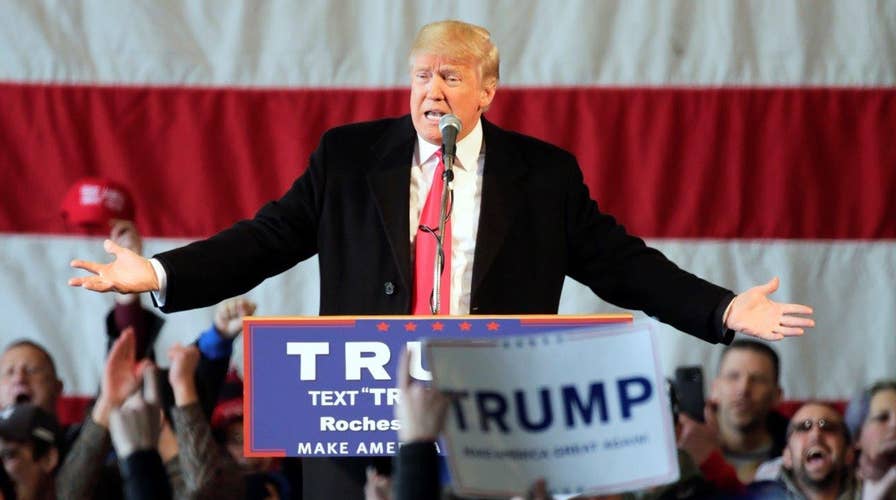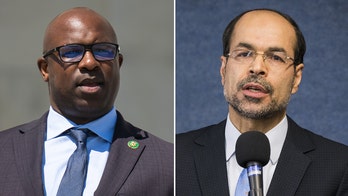Trump slams 'corrupt' GOP nomination process
Strategy Room: Jessica Tarlov and Brian Morgenstern discuss Trump's war on the nominating process amid chatter about other 'options' like Paul Ryan and Gen. James Mattis
As Donald Trump ratchets up his complaints about the Republican nominating process — one he enthusiastically joined last June — the uncertainty in the tightening battle between him and Ted Cruz is kicking up renewed speculation about the possibility of alternative candidates entering the fray.
The latest name surfacing as a late-entry 2016 presidential bid is retired Marine Gen. James Mattis, former commander of Central Command. The Daily Beast published a lengthy report last week on an effort by a group of conservative billionaire donors to convince Mattis to consider an independent run.
According to the report, nearly a dozen donors are ready to back Mattis financially, and already are working with political operatives to draft strategy memos – which apparently have been delivered to the colorful and blunt-spoken retired general himself.
Mattis, though, recently told The Daily Caller the speculation is “just idle talk.”
Former New York Mayor Michael Bloomberg also recently flirted with mounting an independent bid, only to decide against it in the end. Former GOP nominee Mitt Romney, too, decided more than a year ago against running this time around despite insider pressure, though his very public anti-Trump efforts have kept him in the political public eye. Libertarian and other third-party candidates like former New Mexico Gov. Gary Johnson continue to float their own names as alternatives in November for disaffected voters.
Then there’s House Speaker Paul Ryan, who says he’s not interested in being the GOP nominee but is frequently floated as someone who could be a consensus pick at the July convention.
The New York Times reported over the weekend on Ryan’s efforts staying in the public eye, including a video set to “campaign-style music” bemoaning the state of politics.
Sen. Orrin Hatch, R-Utah, said last week that speculation surrounding Ryan is “natural,” calling him one of the “great leaders” on Capitol Hill who brings both sides together.
However, it’s one thing for someone like Mattis to mount an independent run. It’s another for Republicans to nominate at their convention a politician who did not compete in the primaries and caucuses – a move that could sow discord in the party nationally and with voters who backed both Trump and Cruz in the nominating process so far. Trump also has repeatedly threatened to mount an independent bid of his own.
Further, a big hurdle to Paul Ryan or any other outside figure would be a 2012-era rule that states a candidate for the nomination must get the support of a majority of delegates in at least eight states.
The rule could be changed -- but unless it is, it would appear to rule out the consideration of outside candidates, or even Ohio Gov. John Kasich if he doesn’t go on a winning streak soon.
Some analysts say despite the chatter about a non-candidate swooping in to secure the nomination in Cleveland, the party will ultimately have to choose between Trump and Cruz, who by far have won the most delegates. Former House Speaker Newt Gingrich recently argued there’s no chance Trump or Cruz would allow convention rules to be changed so someone else can be considered.
Mattis has actually batted down the chatter about a possible independent run for months. Last year, he told the Marine Corps Times it’s “time for younger people, especially veterans, to run for office.”
But no amount of pushback appears to be quieting that speculation. John Noonan, a former Jeb Bush aide involved in the draft Mattis effort, recently tweeted that Mattis “can save us from Trump—and Clinton.”
Meanwhile, the Trump campaign has been railing against the complex delegate allocation process that Cruz’s campaign lately has dominated. Most recently in Colorado, the Cruz campaign swept the state’s 34 delegates. The state did not hold a traditional primary or caucus but a state convention to determine delegates. Cruz succeeded in getting his allies on the delegate slate.
Speaking to thousands in western New York, Trump argued anew that the person who wins the most votes in the primary process should be the GOP nominee.
"What they're trying to do is subvert the movement with crooked shenanigans," Trump said.
Trump senior policy adviser Stephen Miller told Fox News on Monday that Cruz effectively won a “voter-less” election.
“Cruz performs better with party insiders. Trump performs better with voters,” he said.
Despite the complaints, Cruz came out ahead in Colorado after dedicating resources to the convention process and putting in personal face time on the day of the final vote, something Trump did not do. On Twitter, the Colorado GOP retweeted a message, saying: “You may not like CO's caucus system, but it's representative, and claiming delegates were 'stolen' insults the Republicans who participated.”
Cruz spokeswoman Catherine Frazier also retweeted a message saying the rules “were publicly available for months to people who know how to read and understand words.”
The Associated Press contributed to this report.





